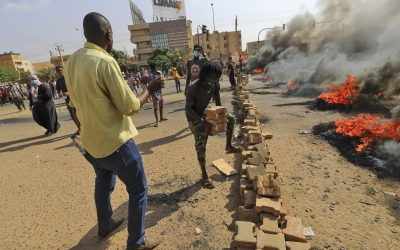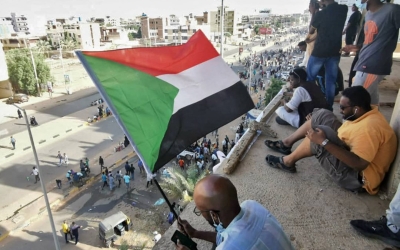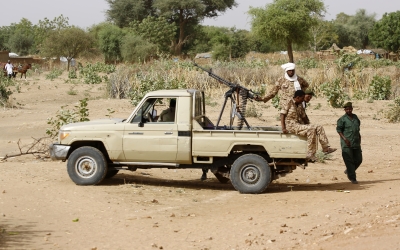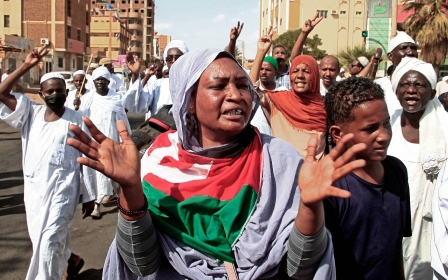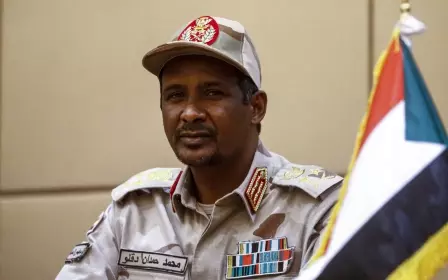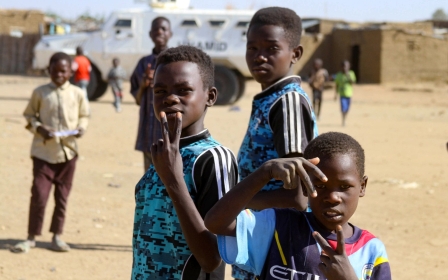Sudan coup: Darfur commander says peace agreement was at risk before takeover
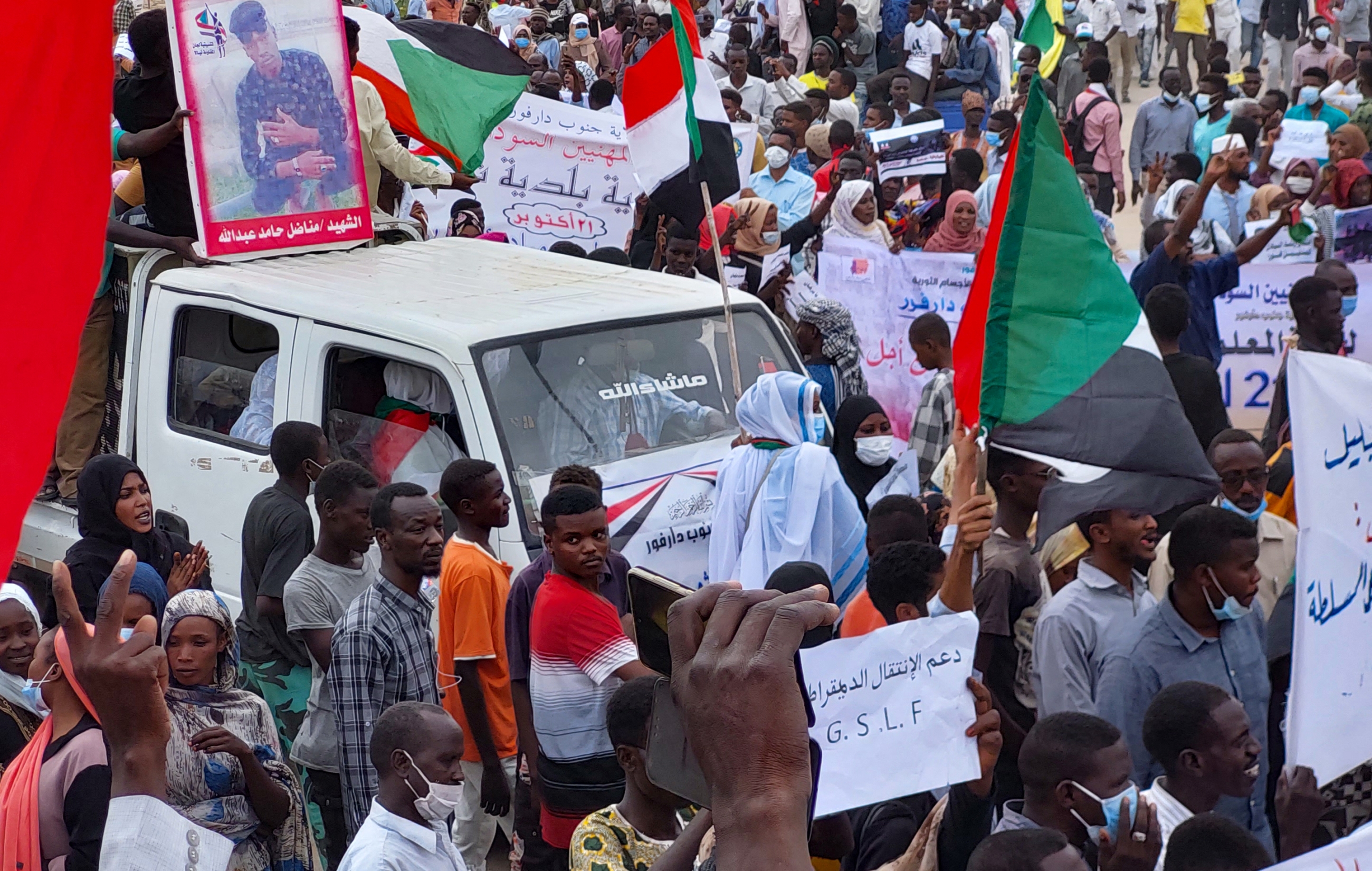
Speaking with Middle East Eye from his office in the Sudanese capital Khartoum, General Khamis Abdallah Abakar sounds at ease, as though the coup has put him back in familiar territory.
For the one-time rebel commander and now governor of West Darfur, the military takeover seems like another part of politicking in a country where conflict and authoritarianism have been all too common.
Rattling off his answers with an obvious awareness of international opinion against the coup, Abakar promises that civilians "will choose the country's next leader" and says protestors must be allowed to assemble peacefully.
As for allegations that Gulf states are supporting the military, he pauses briefly before stating that he has no ties with foreign backers, but that, "right now many different countries are talking to Burhan and others".
Abakar's Darfur-based militia movement is one of the armed groups aligning itself with General Abdel Fattah al-Burhan in his decision to dissolve the country's transitional government, thereby keeping power in the hands of the military just weeks before it was to be passed to civilians.
But the commander's answer on whether he was supporting the military take-over requires clarification. He is backing Burhan but is not against the civilian protesters.
"We are not supporting a military government at all," Abakar said.
Juba agreement
The international spotlight first fell on Sudan after protesters ousted long-time dictator Omar Bashir in 2019. Yet away from the inspiring images of Sudanese celebrating a rare opportunity for a civilian government, tribal intrigue and factional politics continued to play out behind the scenes.
In the end, it was the security forces, particularly the country's dreaded Rapid Support Forces (RSF), whose decision to turn on Bashir gave the protestors their final victory.
Now that the military is clipping the civilian's aspirations, it has turned to the militia leaders of Sudan's far-flung provinces, many of them one-time enemies like Abakar, for new alliances.
Alex de Waal, executive director of the World Peace Foundation, a think tank based at Tufts University’s Fletcher School of Law and Diplomacy, told MEE that this was a tried and tested method in Sudan.
"Burhan is playing the same game that al-Bashir used to play, which is buying and renting the allegiances of provincial chiefs and militia commanders with material inducements."
In October 2020, the country's transitional government signed a peace agreement with rebels who had been waging on and off war against Khartoum, and at times each other, for decades.
The deal paved the way for opposition groups to enter government, their forces to be integrated into the Sudanese military, and funds to be distributed to war-torn regions.
Named after the South Sudanese city in which it was signed, the Juba agreement also included plans to decentralise power towards the provinces and for war reparations to be paid for victims of the many ethnic and tribal conflicts which ravaged regions like Darfur.
Abakar, who leads a faction of the Sudan Liberation Movement, and at one time fought against the military, including the RSF, said the failure of the transitional government to implement this agreement was why he is now siding with old foes.
"We are not supporting Burhan by himself, but because the general will implement the Juba peace agreement. That is very important for us," he said.
According to Abakar, some civilian members of the transition were opposed to carrying out promises made under the Juba agreement. He claims they were unwilling to open up positions in the government for leaders from all of Sudan's 18 provinces and share power accordingly.
"We are working to create a civilian government, but not like before," he added.
Suliman Baldo, a senior adviser at The Sentry, a Washington-based group that works to expose corruption in Africa, said the Juba agreement had effectively stalled, but militia leaders like Abakar were providing cover for the military and serving as "instruments in its attempt to grab power".
Baldo says that many groups do have legitimate grievances about inclusion in the transitional government. He points to cases of politicians being selected to represent regions they are not from, along with the country’s inability to deliver economic payments to the provinces or enact security reform.
But he says the commanders backing Burhan are the very elites who themselves lack any real support in their own home provinces. He says they are merely exploiting the crisis to maintain the powerful positions they have used to rule one of Africa's most beleaguered regions.
Intrigue in the provinces
Abakar was appointed governor - or Wali of West Darfur - earlier this year by the now-ousted Prime Minister Abdalla Hamdok as part of the Juba peace process that also brought other senior rebel leaders into positions of power in the government.
Minni Minawi, who heads one of the better armed breakaway factions of the Sudan Liberation Army (SLA), was named governor of the entire Darfur region, while Jibril Ibrahim, leader of the Justice and Equality Movement (JEM) in Darfur, was appointed minister of finance.
In the early 2000s, these men led tribal fighters against Arab horse-back militias, known as the Janjaweed, empowered by the Bashir government to wage a brutal conflict in Darfur that claimed the lives of over 300,000 people.
Led by the notorious General Mohamed Hamdan Dagalo, who goes by the name Hemeti, the Janjaweed eventually transformed into the RSF and became a praetorian guard of the military and Bashir government.
Long victimised by Khartoum and the RSF, Darfuris looked on with hope after Bashir was ousted. But now the very forces that once pillaged Sudan's western province are receiving support from commanders who claim to represent the region.
"Some commanders from Juba Agreement signatory groups, appeared to see a close relationship with the military, especially Hemedti, as the most advantageous route to lasting power and political relevance in Sudan," Jonas Horner, a senior analyst at the International Crisis Group, told MEE.
Ibrahim and Minnawi played a behind the scenes political role in mobilising for the coup, and are believed to have supported a sit-in outside the presidential palace that called for a replacement of the transitional government by an administration of technocrats.
A hybrid mix of warlords, clan chiefs, and politicians, these men continue to wield armed groups and have sent forces into Khartoum; though analysts say it's unclear how closely they are coordinating with the RSF in suppressing protests.
Asked by MEE if he has directed forces to suppress the protests, Abakar, who said he was leaving Khartoum in order to return to West Darfur, said he did not support violence against demonstrators.
Alliances
A 2021 report by the International Crisis Group released before last month's coup warned about the growing ties between the military and militias.
While welcoming the peace process, it said the Juba Agreement, "risk[ed] bloating the military and sets up a prospective political alliance between the rebels and Sudanese security forces".
"[This could] further sideline the government’s civilian cabinet and threaten to bury its reform agenda," it added.
This is not the first time the RSF and some Darfur militias would cast aside hostilities to fight on the same side of a conflict.
Abakar's militia is reported to have been deployed to fight in Libya in support of the country's eastern commander Khalifa Haftar, where Hemeti's forces are also active.
Minnawi and Ibrahim, the two most prominent Darfuris serving in Sudan’s government and currently backing the coup, have also sent militias to aid Haftar and have been active in Libya's lawless south.
At the same time, analysts told MEE that these militias had been weakened at home, in part because they had sent fighters abroad. Their numbers have been worn down by decades of conflict with the government and their images have been tainted by a revolving door of allegiances.
"They don't control treasury or populations. And their military capacity on the ground is very diminished," Baldo stated.
Abdel Wahid al-Nur, whose faction of the Sudan Liberation Army is believed to be the most powerful and popular in Darfur, boycotted the Juba talks and has positioned himself against the coup.
“The rebels and former rebels who have real constituencies of support are opposed to the military,” and take-over, de Waal told MEE.
Baldo said the militia leaders backing of the coup offers Burhan a “talking point" rather than a significant increase in fire-power, which comes mostly from the RSF.
"The military and the militias each rely on each other for strength in the absence of a political, ideological or social base," he said.
With hundreds of thousands of Sudanese taking to the streets to protest against the coup and showing resilience in the face of the security forces, it’s unclear if the Darfur commanders’ gambit will pay off.
At the moment it seems like militia leaders are more along for the ride, as powerful actors like Hemeti position themselves for the future.
"The coup reflects existential military and Islamists fears over maintaining wealth and power and over avoiding justice," said Horner, who believes the Darfur commanders' support will have limited effect.
In the interview, Abakar comes across more as a surviving politician, albeit an armed one, than as a firebrand commander, as he leaves himself room to adapt to the evolving situation.
For now, he is supporting the military take-over, but "would like to see Burhan step down, and a civilian government that comes from all of Sudan’s 18 states [emerge]".
Middle East Eye propose une couverture et une analyse indépendantes et incomparables du Moyen-Orient, de l’Afrique du Nord et d’autres régions du monde. Pour en savoir plus sur la reprise de ce contenu et les frais qui s’appliquent, veuillez remplir ce formulaire [en anglais]. Pour en savoir plus sur MEE, cliquez ici [en anglais].


